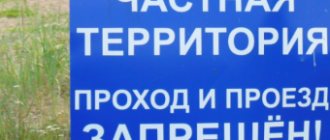Illegal entry into housing means entering there without the consent of the residents or in their absence. To be held accountable, it is necessary to prove that the guilty person acted intentionally and did not have independent rights to the property. Punishment for illegal entry into a home is established by Article 139 of the Criminal Code of the Russian Federation, and a real prison term is threatened only for the use of physical force or the threat of its use. If the offender tried to realize his plan to gain access to a residential premises, but did not complete it, he will be subject to sanctions for attempted illegal entry into a dwelling. This criminal act is characterized by the following features: The use of weapons is considered justified in the event of an attack or at the beginning of penetration into a house, that is, when the intruder begins to break windows or break down a door.
In this case, the time of the beginning and end of the encroachment will be taken into account. If you shoot before any damage has been caused to you, or the attacker simply crosses the gate and stands at the window without attempting to break in, then the issue will be moot.
- fine up to 40 thousand rubles;
- compulsory work up to 360 hours;
- corrective labor for up to 1 year;
- as well as arrest for 3 months.
When submitting a document to the police, it must be registered in a special journal. And to confirm this fact, the applicant will be given a notification form with an assigned serial number.
- penalties up to 40 thousand rubles;
- correctional work for no more than 1 year;
- compulsory work up to 360 hours;
- imprisonment for up to 3 months.
"18. Illegal entry into a home, premises or other storage facility should be understood as an unlawful secret or open intrusion into them for the purpose of committing theft, robbery or robbery. Penetration into the specified buildings or structures can also be carried out when the culprit removes stolen objects without entering the corresponding premises. “A person is held criminally liable for illegal entry into a home, regardless of the actions that he performed (or did not perform) there. The very fact of entering a home against the will of the person living there is sufficient (Article 139 of the Criminal Code).
This act is punishable by a fine, or compulsory labor, or correctional labor, or arrest. At the same time, as S. M. Kochoi rightly noted, “the interpretation by the Plenum of the Supreme Court of the USSR of “penetration as” an “invasion” raises doubts in our opinion. Is it illegal entry into a home, premises or other storage? The word "invade" means "to enter by force." The latter is typical for robbery and robbery, but not theft.
In Russian, “penetrate” means “get in, get through.” Apparently, this is how the Plenum of the Supreme Court of the USSR should have interpreted the term “penetration Kochoi S.M. Responsibility for selfish crimes against property / S.M. Kochoi. - M.: ANTEY, 2000. - P. 150.. Currently, a note to Art. 158 of the Criminal Code of the Russian Federation has been supplemented with clause 3, which explains: “In the articles of this chapter, a storage facility means utility premises, separate from residential buildings, areas of territory, main pipelines, and other structures, regardless of the form of ownership, that are equipped with fencing or technical means or are otherwise provided security and are intended for permanent or temporary storage of material assets.” Good afternoon Of course you haven't given enough information...
That's why it is so. If the burglary was in someone else's
non-residential premises and caused significant damage in order to take away their property, then this act can well be qualified as arbitrariness, Article 330 of the Criminal Code of the Russian Federation. If no significant harm was caused to a citizen or legal entity, then in this case, Article 19.1 of the Code of Administrative Offenses of the Russian Federation, which is also called arbitrariness (fine from 100 to 300 rubles) Responsibility for illegal entry into non-residential premises without theft of a minor.
Article of the Criminal Code of the Russian Federation: entry into non-residential premises with burglary
But when we are talking about premises that do not belong to commercial or non-residential real estate, for example, a barn, we cannot talk about illegal entry into a home. For illegal entry into commercial real estate, a completely different article of the Criminal Code is used for punishment.
was convicted by the magistrate of court district No. 46 of the Chernsky district of the Tula region for the fact that, while intoxicated, he came to the front door of the apartment in which his friend Ya. lived, in order to talk with Kh., who was in the apartment. He knocked on the door, but no one opened it to him.
This means that no one can invade it against the will of the subjects located in it. 148 lawyers are now on the site All topics were penetration into my garage and theft of personal belongings and furniture since after the sale of his apartment the buyer did not allow a single day to live in the sold one apartment and I had to take all the things from the three-room apartment: kitchen furniture, piano set -.
How to write a statement to the police regarding obstruction to the use of residential premises
The application should be submitted to the police department at the location of the disputed property. Also, in the event of a violation of housing rights, the local police officer of the relevant police department may be called.
Remember, you can submit an application by contacting the police department directly, or you can file it directly at the scene of the conflict when calling the police.
Don't forget to receive a receipt for your application. It must indicate: number, date of acceptance, name of the accepting body.
The statement should reflect in detail all the circumstances of the housing conflict:
- Address of the disputed housing
- Date and time when attempts were made to move into the property
- Data of persons who are preventing you from moving into and using residential premises, as well as the reasons for their residence at this address
- Indicate what specific obstacles are being created: changing the locks on the door, refusal to issue a set of keys to the front door, refusal to open the door, obstacles to moving in, throwing personal belongings out of the apartment, etc.
- Presence of witnesses to the incident, their details, contacts
- Other circumstances of the conflict
The application should be accompanied by a copy of your general passport with information about registration at this address, a copy of the certificate of ownership (extract from the Unified State Register of Real Estate), and other title documents for the disputed residential premises.
However, the police are simply unable to resolve the substance of the dispute between the participants in the housing conflict, move a person into an apartment and oblige the violators not to interfere with his residence.
Lawyer for housing disputes in St. Petersburg. Tel.+7 Telephone consultation
The reason for this is the fact that your dispute is of a civil nature, which can only be resolved by a court.
That is why calling the police to the scene of the crime does not bring any real results; it all ends with a formal reply about the need for the applicant to go to court to protect his violated rights.
All that the victim can count on is police material, which reflects all the circumstances of the dispute. KUSP material is created on the basis of an application. Police officers who arrive on a call are required to obtain written explanations from all participants in the conflict and include them in the material.
A police officer also has the right to explain to violators the right of a person trying to move into a residential premises to move into, use and dispose of the disputed property, as provided for by the current civil and housing legislation of the Russian Federation, and to warn violators about the illegality of their actions to obstruct this person in using the residential premises. premises, about which a corresponding act is drawn up, which is also attached to the KUSP material.
The police do not have any other methods of influencing violators.
Based on the results of consideration of such an application, law enforcement agencies must make a procedural decision. As a rule, this is a decision to refuse to initiate a criminal case due to the existence of a civil dispute resolved by the court, with recommendations to go to court to protect one’s violated rights.
The KUSP material created on the basis of your application will be needed in court as evidence of a violation of your housing rights.
Illegal entry into a home (art.
- Monetary recovery up to 40 thousand rubles. or equal to the amount of salary/income for 3 months.
- Correctional labor for up to a year.
- Arrest up to 3 months
- Compulsory work for 120-180 hours.
Illegal entry into a home is a criminal offense. It is committed against the will of the person who is in such a room. The article of the Criminal Code “Illegal entry into a home” contains three parts.
Let's look at them in detail.
- A monetary penalty in the amount of 100 to 300 tr. or equal to the amount of the perpetrator’s salary/income for 1-2 years.
- A ban on holding certain positions and engaging in specific activities for a period of 2 to 5 years.
- Arrest for 2-4 months.
- Imprisonment up to 3 years.
For the specified act, committed against the will of the subject staying in the premises, punishment is provided in the form.
- Monetary recovery up to 200 tr. or in the amount of income/salary for a period of up to one and a half years.
- Imprisonment up to 2 years.
Article 139 of the Criminal Code of the Russian Federation Illegal entry into a home
The article for illegal entry contains three main points:
The corpus delicti is determined by its individual characteristics. All of them involve illegal entry. If, for example, there is a premises attached to the dwelling, entering it will also be considered an illegal act.
Only in case of repeated identical violations does the judge use more severe punishments for the defendant. When a person appears in the dock for the first time, the judge gives him a chance to improve. When illegal entry is carried out together with burglary, additional punishment for this offense is formed in parallel.
If there is an attempt on life, the guilty person will be additionally punished for this act. For this purpose, articles are provided for bodily injury and battery. When the entry is carried out for the purpose of stealing, another article is used to prosecute. When a person enters a premises using his official position for selfish reasons, he is liable.
My home is my fortress: what is the penalty for illegal entry into a home?
It is important to pay attention to the moment when the crime is considered completed .
What is the responsibility for disclosing medical confidentiality? Find out about this from our article.
For a crime to be considered committed, it is not at all necessary that the offender personally entered the premises. Actions to introduce various technical means into someone else's home, for example, hidden cameras and listening devices, are also considered illegal. According to current legislation, various types of punishment are applied to an intruder who enters private property. This, in particular, is an illegal search or entry into the home of a third party to steal material goods found in it, or to commit other illegal actions directed against the owner’s property or his health and life.
Illegal entry into a home
- signs of forced entry into doors or windows;
- things and objects scattered around the rooms, etc.
The crime will be considered committed the moment the criminal enters the home and it does not matter whether he carries out his plan to the end or not.
At the same time, there is a list of premises that do not belong to the category of “housing”: a barn, a garage, a barn, a woodshed, a barn, a cabin on a ship or a train compartment.
- the fine varies from 100 to 300 thousand rubles;
- restriction of freedom up to 4 months;
- imprisonment for up to 3 years;
- forced labor;
- prohibition from holding certain positions for up to 5 years.
The object of the crime is considered to be residential premises designed for permanent or temporary residence of people. Let's consider the main categories: If a criminal has violated part one of the article, then the justice authorities can apply one of the following types of punishment to him: Thus, in the comments to the Criminal Code of the Russian Federation it is determined that violation of the inviolability of private property is limited to residential premises.
The article for illegal entry contains three main points:
Additionally, article one hundred thirty-nine includes a definition of residential premises from the point of view of criminal law.
Let’s say that the integrity of a home can be violated by fire services to extinguish a fire or by ambulance personnel to save a person’s life. Investigative jurisdiction, or a set of signs of a crime, plays an important role in making a court decision. If such crimes are committed repeatedly, the court may impose imprisonment for up to two years. The specific object of theft is property relations in general, which, in turn, include the rights of each specific owner to own, use and dispose of their property.
These rights are considered as the object of a crime even if an act is committed in relation to the property of another right holder, and not just the owner.
Claim for entry and non-obstruction in the use of residential premises
The following demands can be made in the statement of claim:
- On the defendant’s obligation not to interfere with the plaintiff’s use of residential premises
- About moving into residential premises
- On determining the procedure for using residential premises (if the housing is owned)
- On the obligation to issue a set of keys to the entrance door to a residential premises
The plaintiff must prove the fact of violation of his housing rights, namely, the following circumstances:
- The plaintiff is prevented from accessing the disputed housing (the door locks were changed, they were not given a set of keys, etc.)
- The plaintiff attempted to move into the disputed housing, but the defendant prevented him from doing so.
Evidence in court will include:
- Material from the police, collected at the request of the plaintiff about obstructing his use of housing (it is necessary to file a petition in court to request the KUSP material from the police for review)
- Act on lack of access to residential premises, drawn up with the participation of a representative of the management company or housing office
- Photos and (or) video materials confirming the fact of violation of housing rights
- Other written evidence
- Witness's testimonies
Jurisdiction: The statement of claim for non-obstruction of the use of residential premises and occupancy is considered by the district court (Article 24 of the Code of Civil Procedure of the Russian Federation) at the place of residence of the defendant, i.e. In this case, the general rules of jurisdiction established by Art. 28 Code of Civil Procedure of the Russian Federation.
In law enforcement practice, there are cases of sending such cases according to jurisdiction to the courts at the location of the disputed property, or returning claims with reference to the rules of exclusive jurisdiction (Article 30 of the Code of Civil Procedure of the Russian Federation), which are subject to application to these legal relations. However, higher courts recognize such determinations as illegal, rightly pointing out to colleagues from lower courts that the rules of exclusive jurisdiction can only be applied if the claim states a demand for recognition of the right to residential premises, while the demand for the elimination of obstacles to the use This is not housing.
State duty: The requirement to eliminate a violation of housing rights is of a non-property nature, and therefore is paid with a state duty in accordance with paragraphs. 3 p. 1 art. 333.19 of the Tax Code of the Russian Federation - in the amount of 300 rubles for each claim.
That is, if the claim states only one demand to remove obstacles to the use of housing, you must pay 300 rubles, but if the second demand is for moving into an apartment, you must pay 600 rubles, etc.
If the plaintiff is exempt from paying state fees, then the claim must indicate this and attach documents that are the basis for exemption from paying state fees.
Limitation period: In accordance with Art. 196 of the Civil Code of the Russian Federation, the general limitation period is three years. However, claims for moving in and removing obstacles to the use of housing are not subject to limitation due to the fact that housing legal relations are ongoing.
Also, Article 208 of the Civil Code of the Russian Federation directly provides that the limitation period does not apply to the owner’s claims based on the provisions of Art. 304 of the Civil Code of the Russian Federation - on eliminating violations of the rights of the owner.
\
In turn, the right of ownership to the civil category, which is regulated by Art. 209 of the Civil Code of the Russian Federation [2] (hereinafter referred to as the Civil Code of the Russian Federation). As can be seen from the above formulations of qualifying (especially qualifying) features, there is a certain inconsistency among the legislator regarding the regulation of liability for crimes against property committed with unlawful entry.
- Monetary recovery up to 40 thousand rubles. or equal to the amount of salary/income for 3 months.
- Correctional labor for up to a year.
- Arrest up to 3 months
- Compulsory work for 120-180 hours.
For the specified act, committed against the will of the subject staying in the premises, punishment is provided in the form of:
The limits and grounds for restricting the constitutional rights of persons are established by Art. 11 clauses 18 and 24 of the Law “On the Police” (adopted during the period of the RSFSR) as amended by the Federal Law of 1993, as well as Art. 6, 7 and 9 of the Federal Law regulating operational investigative activities, the Code of Criminal Procedure, paragraph “e” of the Federal Law regulating the activities of federal state security agencies with additions and amendments introduced into it by the Law of July 1, 1993. The latest regulatory document has become invalid due to the adoption Federal Law No. 40. Illegal entry into a home is a criminal offense. It is committed against the will of the person who is in such a room. The article of the Criminal Code “Illegal entry into a home” contains three parts.
Let's look at them in detail. Unlawful entry constitutes trespassing. It can be carried out either secretly or openly. In this case, the attacker can overcome any obstacles or resistance of people in the room. According to the Criminal Code of the Russian Federation, illegal entry can be unhindered.
The perpetrator can commit a crime using any means or objects. Entering a home and controlling the premises from the inside using special technical devices will be considered illegal entry.
The owner is not allowed into the apartment
The situation when one owner does not allow another owner into the apartment is very common. The reasons may be different.
If the disputed apartment has several rooms and each owner has a separate living space (room), then the outcome of such a dispute in court is obvious. In any case, the court will oblige the defendant to eliminate violations of the rights of the co-owner.
The owner’s demand to eliminate obstacles to the use of residential premises is based on the provisions of Article 304 of the Civil Code of the Russian Federation , which states that the owner has the right to demand the elimination of any violations of his rights, although they were not associated with deprivation of possession.
The procedure for use
can only be determined in an apartment that is owned (Article 247 of the Civil Code of the Russian Federation).
The law does not provide for determining the procedure for using a municipal apartment (under a social tenancy agreement). In judicial practice, there are often cases when the subject of a dispute becomes a residential premises, which provides a one-room apartment or room. Of course, the owner who actually occupies the area in every possible way prevents the second holder of a share in the property from living in such housing, since their joint residence in such an apartment is simply impossible due to the banal absence of separate premises in the apartment. In such cases, the court, even having obliged the defendant not to interfere with the plaintiff’s use of the housing and having moved the plaintiff into it, will not be able to determine the procedure for using such residential premises.
What is the penalty for entering private territory under the article of the Criminal Code of the Russian Federation?
- fine;
- correctional labor;
- forced labor;
- imprisonment.
Part two. This is followed by Part 2 of Article 139. It normatively defines a crime accompanied by violence or the threat of its use when entering private property.
The first action is lawful only at the moment when the criminal attack begins - doors, windows, garage doors are broken into, and it will last until the moment when the criminal’s actions are associated with confrontation with leaving the house. What is the penalty for stealing a car while drunk without a driver's license? The Criminal Code of the Russian Federation contains Article 139 on punishment for violating the inviolability of the home.
This article contains 3 dispositions with their own objective aspects of the unlawful action being committed.
However, the legislator does not give them expanded powers, since it obliges them to warn about the visit and the purpose of the visit.
Other
What is theft?
Theft is the secret theft of someone else's property without the knowledge of its owner for personal gain (that is, for the purpose of making a profit). Theft can be safely recognized as one of the most diverse and multifaceted offenses in the Criminal Code of the Russian Federation - its forms are extremely numerous, and it can be carried out using a variety of methods.
The Criminal Code of the Russian Federation provides for a separate article under number 158 of the Criminal Code of the Russian Federation for such a crime as theft. It contains four parts, each of which describes a variety of offenses:
- Part one describes standard thefts without any special features or aggravating circumstances;
- Part two describes thefts committed by several citizens in conspiracy, from clothes or bags, from non-residential premises, as well as any thefts that caused harm to a citizen;
- Part three examines thefts from some structures provided for the supply of resources (oil pipeline, gas pipeline, etc.). She also considers thefts from residential premises or on a large scale (more than 250,000 rubles);
- Part four examines the last two types of thefts - committed by an Organized Crime Group or on a particularly large scale (more than one million rubles).
Popular tags
Committing a crime Composition of a crime Article of the Criminal Code car administrative initiation civil money activity document complaint law statement health property execution supervision punishment sample application release grounds liability refusal to submit police receiving order resolution right preliminary termination involvement causing harm production prosecutor's office prosecutor process decision witness investigation deadlines judicial condition petition storage








